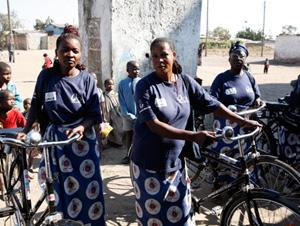World Bicycle Relief
HIV caregivers in Zambia (Image: Leah Missbach Day, World Bicycle Relief)
Beginning this spring, some poor school children in the south African nation of Zambia will no longer have to walk long distances to school. They’re getting specially designed bikes courtesy of a Chicago foundation. The group started four years ago. It’s called World Bicycle Relief. "The World" reporter Jay Field has the story.
On December 26th, 2004, F.K. Day watched on TV as violent floodwaters spread destruction a world away. A devastating Tsunami had hit Indonesia, Thailand, and Sri Lanka, and Day, who runs Chicago Bike Parks Giant Tram Corporation, wanted to help. So after talking with his wife and his co-workers, he picked up the phone and started dialing.
F.K. DAY: "We called a number of the relief organizations in the US and said, ‘What do you guys think if we did a large scale bicycle program and supported people trying to recover from the Tsunami?’ And all of the relief organizations in the US of course said, ‘no, no, no. Just send us money.’"
Undeterred, Day and his wife hopped a plane to Jakarta, Indonesia, and then on to Sri Lanka. When they reached that country’s water ravaged East Coast, they saw people walking everywhere.
F.K. DAY: "People would walk for hours and hours and hours. And a poor person recovering from something as devastating a Tsunami, really needs that extra time per day to help stabilize their family, stabilize their communities, connect themselves with health care, get their kids reconnected with education, re-orient themselves with some level of economic livelihood."
Day left convinced that the bikes held the key. The aid group World Vision agreed to partner with him. Treck Bicycle came on board, too, and a new organization, World Bicycle Relief, was born. It operates out of Tram Corporation’s wide-open industrial headquarters in Chicago.
World Bicycle Relief provided more than 23,000 bikes for its current project — expanding and improving home-based care for people living with HIV in Zambia.
Paul Blume is with the Center for Social Entrepreneurship at Duke University’s Business School: "There are a lot of organizations out there that are trying to deal with problems of a similar character. I think that what’s a little different about this is that there is involvement of two major corporations that provide a lot of the seed money, in a sense, for what’s happening. To their credit, I think they’re trying to build mini economies around this – or businesses around this."
When bikes are delivered in Zambia, HIV caregivers sign a contract promising to volunteer in the program for 3 years. They’re free to use the bikes during off hours. The bikes become theirs when their contract expires.
A critical need, in a country where 15 percent of adults are infected with HIV, according to the World Health Organization, and nearly 60,000 die of AIDS each year. In the spring, World Bicycle Relief starts another project. It plans to supply 50,000 bicycles to help Zambian children get to school. For The World, I’m Jay Field.
PRI’s "The World" is a one-hour, weekday radio news magazine offering a mix of news, features, interviews, and music from around the globe. "The World" is a co-production of the BBC World Service, PRI and WGBH Boston.
